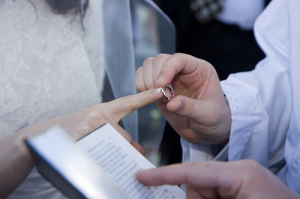Baffled by California community property?
Think it makes you personally liable for the debts of your spouse?
Lots of people do. But it doesn’t.
California has been a community property state since it became a state in 1850. You would think we’d have gotten the hang of it long ago.
But the community property system continues to confound some married folks, not to mention lots of debt collectors outside of California,
Let’s review 7 basic facts about California community property.
1 Property acquired during marriage is presumed to be community
Wages, benefits, lottery winnings: if they are earned or acquired during marriage, they are community property. The name of one spouse on the title does not overcome the presumption.
Assets either spouse brings to the marriage are separate property. Gifts and inheritances acquired during marriage are the separate property of the spouse who acquires them. Family Code § 770.
Do nothing, and your acquisitions during marriage belong to the two of you, equally. Family Code § 760.
2 The spouses have equal, undivided interests in all community property
While at any division of the community, each spouse gets half, during marriage they have an undivided interest in all of the community. Family Code § 751.
3 Community property is liable for the debts of either spouse incurred during marriage
The entire community is exposed to the debts of either spouse. That means that the wages of one spouse can be garnished by the judgment creditor of the other spouse. Financially, we’re all in this together. Family Code § 910.
4 Community property is liable for the debts either spouse brings to the marriage
The liability of community property extends to debts that either spouse incurred before the wedding. Family Code § 910.
There is a small exception here: the community property wages of one spouse can’t be garnished for the premarital debts of the other if the wages are kept in a separate bank account to which only the earning spouse has access. Family Code § 911
5 Spouses can agree not to have community property
The community property scheme is the default arrangement.
By entering into a prenuptial or post nuptial agreement, spouses can agree not to have community property, or agree that only certain property will be community.
They can also agree to transmute community property into separate property. A deed from one spouse to another may not be sufficient to constitute a transmutation into separate property.
Transmutations must be in writing, so the intention of both parties is clear. Family Code § 852.
6 Property acquired after the spouses separate is not community property
Even still legally married, earnings after separation are separate property. Family Code § 771. That’s why the date of separation can be critical when parties divorce.
The character of property acquired before separation isn’t changed by the marital breakdown; it remains community until a court judgment divides the community.
7 Community property must be divided equally in a dissolution
Because the community belongs equally to the spouses, they are each entitled to an equal share of the community upon the termination of the marriage. They can, of course, agree to some other division.
What community property doesn’t mean
The most common misconception about community property is that it makes each spouse liable for the debts incurred by the other. Not so.
The community property is liable for those debts. But when the community ends, at death or divorce, each spouse is liable only for their own debts.
If they get a share of the community property, that property is that person’s separate property.
The separate property of one spouse is not liable for debts incurred by the other. Family Code § 913. That’s true whether it’s separate property brought to the marriage or separate property created by divorce.
In my view, marriage in California is, for purposes of debtor/creditor questions, a menage a trois: the two spouses and the Community.
More
When one spouse files bankruptcy
Community property after spouse’s bankruptcy
Make your divorce bankruptcy-proof
Image courtesy of Flickr and Justin Oberman.







